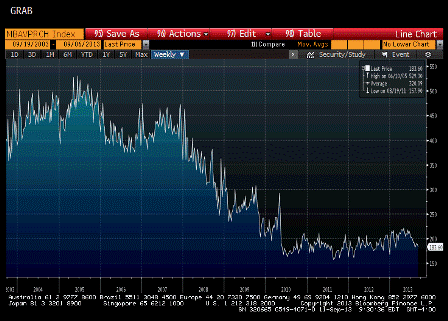Report: New Home Sales soft in August
By Bill McBride
Daily Archives: September 11, 2013 @ 2:43 pm (Wednesday)
Whither QE?
Mtg rates are up by over a full 1%, because the Fed may scale back on QE. But it hasn’t scaled back yet. But rates are way higher anyway.
So the question is, does QE per se keep down rates?
Or does it just about signals?
So when this last round of QE began, why did rates go down? It couldn’t have been just because the Fed was going to buy, which would then drive rates down, because it’s now already bought, and will continue to buy, yet rates are suddenly far higher.
Nor did rates fall with QE because market participants though it would make the economy worse?
It’s about rates falling on the belief that Fed buying per se would bring them down, and now rates are higher on the belief that the Fed not buying as much means rates go higher. Even though it’s been demonstrated that the amount or pace of Fed buying per say doesn’t do that.
There is no way to make any sense out of it.
It’s just knee jerk reactions in a sea of ignorance.
Obama the ‘socialist’…
Best Times for the 1 Percent Since 1920s
By Paul Wiseman
September 11 (AP) — The richest Americans were hit hard by the financial crisis. Their incomes fell more than 36 percent in the Great Recession of 2007-09 as stock prices plummeted. Incomes for the bottom 99 percent fell just 11.6 percent, according to the analysis.
But since the recession officially ended in June 2009, the top 1 percent have enjoyed the benefits of rising corporate profits and stock prices: 95 percent of the income gains reported since 2009 have gone to the top 1 percent.
That compares with a 45 percent share for the top 1 percent in the economic expansion of the 1990s and a 65 percent share from the expansion that followed the 2001 recession.
The top 1 percent of American households had pretax income above $394,000 last year. The top 10 percent had income exceeding $114,000.
Mtg apps down a bunch more
Graph looks like it fell off a cliff.
Who would’ve thought…
U.S. Mortgage Applications Down
September 11 — The number of mortgage applications filed in the U.S. last week fell 13.5% from the prior week on a seasonally adjusted basis as interest rates increased, the Mortgage Bankers Association said Wednesday.
On an unadjusted basis, MBA reported the market composite index declined 23%. The refinance index slipped 28% from a week earlier, while the seasonally adjusted purchase index slid 2.7%.
Higher rates had curbed demand for buy new homes and made refinancing less attractive.
The share of applications filled to refinance existing mortgages fell to 57% from 61% a week earlier. In the latest week, adjusted-rate mortgages, or ARMs, represented 7.1% of total applications.

Full size image
